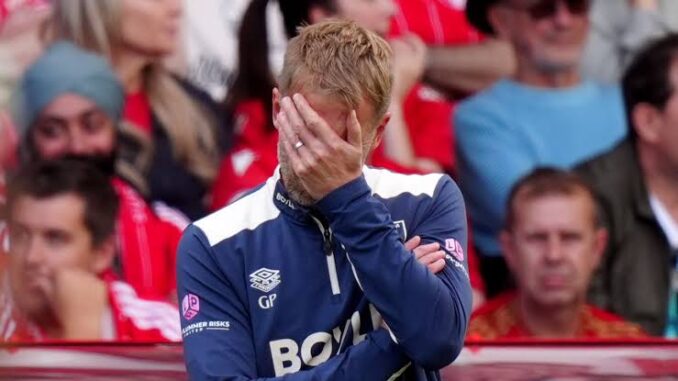
Breaking News: Graham Potter sacked: West Ham fire head coach but deeper problems remain..read more
Breaking News: Graham Potter Sacked — West Ham Fire Head Coach but Deeper Problems Remain
The news has just shaken English football: West Ham United have sacked head coach Graham Potter, ending his turbulent reign in East London. While the headlines scream about the managerial dismissal, the reality is far more complex. West Ham’s issues go deeper than the man on the touchline, stretching into the club’s structure, recruitment policy, player unrest, and long-term identity crisis.
This is more than just the story of one manager’s failure — it’s the tale of a club battling itself.
—
1. The Announcement and Immediate Fallout
Late last night, West Ham confirmed that Graham Potter had been relieved of his duties with immediate effect. A brief statement from the club thanked him for his efforts but made clear that results and performances had fallen below expectations.
The announcement came just hours after yet another demoralizing defeat — this time at home, in front of restless fans who booed the players off the pitch. The club slipped further down the Premier League table, with European ambitions all but extinguished and fears of another relegation scrap looming.
For many supporters, Potter’s dismissal was inevitable. His tenure was marked by inconsistency, tactical confusion, and a visible lack of belief within the squad. But for others, it raises a deeper, more troubling question: Was he truly the problem, or just another casualty of West Ham’s deeper dysfunction?
—
2. Why Potter Failed at West Ham
Graham Potter arrived in East London with a reputation as a progressive thinker, a builder of footballing identities, and a man capable of lifting underdog clubs beyond their limits. His success at Brighton made him a prized name, and after his rocky spell at Chelsea, West Ham offered him a chance at redemption.
But things quickly fell apart.
Inconsistent Tactics: Fans never saw a settled style of play. One week it was possession-based passing, the next it was reactive counterattacking. Players admitted behind closed doors that they were “confused” about their roles.
Man-Management Issues: Potter’s calm, introverted demeanor—once seen as a strength—struggled to inspire a squad used to David Moyes’ fire. Senior players reportedly questioned his authority, while younger stars felt underutilized.
Poor Results: Key matches were lost with alarming ease. Heavy defeats to direct rivals, a meek FA Cup exit, and a humiliating European collapse all cemented the narrative that Potter could not steady the ship.
Ultimately, Potter became a man caught between his ideals and the brutal reality of West Ham’s culture. He was tasked with evolution, but instead got swallowed by instability.
—
3. The Deeper Problems: Beyond the Manager
Sacking Potter may offer a temporary sense of relief, but West Ham’s problems run far deeper than one man.
a) Ownership and Identity Crisis
Under David Sullivan and the board, West Ham have lurched between visions: are they a club chasing European nights or merely Premier League survival? That lack of clarity filters into every decision, from recruitment to managerial appointments.
b) Recruitment and Squad Imbalance
The squad is a patchwork of players signed under different regimes. Some fit a defensive system, others want expansive football. Expensive flops and panic buys have left West Ham bloated but lacking balance.
c) Dressing Room Politics
Reports suggest divisions in the squad — older pros versus younger talents, big-money signings versus academy players. Without a strong leader to unify them, rifts widen.
d) Fan Discontent
The London Stadium, already criticized for its lack of atmosphere, has turned toxic. Chants calling for the board’s resignation echo loudly, with fans demanding not just a new manager but wholesale structural change.
—
4. Who Comes Next?
Attention immediately turns to who might take over. Early speculation suggests names such as:
Julen Lopetegui: Experienced, disciplined, available.
Paulo Fonseca: Attack-minded, modern, but risky.
Michael Carrick: A club legend with potential, though unproven at the highest level.
Interim Option: The club may choose a caretaker until summer to stabilize the dressing room.
But the truth is this: it won’t matter who arrives unless West Ham confront their underlying issues. The new man will inherit the same fractured squad, the same structural uncertainty, and the same fan pressure.
—
5. Lessons from the Potter Era
Potter’s sacking is just the latest episode in West Ham’s revolving-door approach to managers. From Sam Allardyce to Slaven Bilić, Manuel Pellegrini to David Moyes, the story has been the same: initial hope, brief success, then collapse.
The lesson is clear: managers alone cannot save West Ham. Unless the club modernizes its sporting structure—appointing a director of football with real power, committing to a clear style of play, and fixing its recruitment strategy—history will repeat itself again and again.
—
6. What the Fans Say
On social media, West Ham supporters were divided:
Some rejoiced at Potter’s dismissal, calling it overdue.
Others lamented the club’s short-termism, arguing that no manager could succeed under current conditions.
Many agreed on one thing: the board must take responsibility.
A fan tweet that went viral summed it up best:
> “You can sack Potter, Moyes, Pellegrini, Bilic, whoever. But until Sullivan and co. change how this club is run, we’ll always be West Ham: promise, chaos, and heartbreak.”
—
7. What’s Next for Graham Potter?
For Potter, this is another brutal blow to his once-rising reputation. From Brighton hero to Chelsea disaster to West Ham casualty, his managerial career now hangs at a crossroads.
Does he retreat from the spotlight, rebuild abroad, or take a step back into a lower-pressure environment? The talent remains, but so do the scars.
—
8. Conclusion: The Cycle Continues
Graham Potter’s sacking will dominate headlines for days, but West Ham’s real battle is only just beginning. Until they confront their identity crisis, fix recruitment, and bridge the divide between board, manager, and fans, they will remain trapped in the same destructive cycle.
Leave a Reply